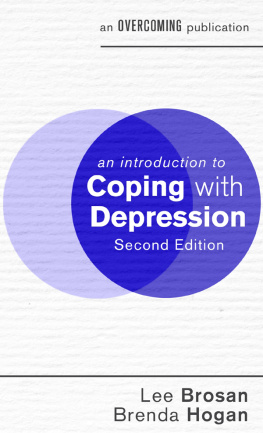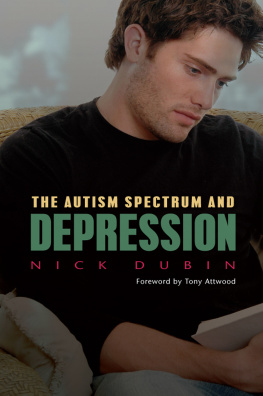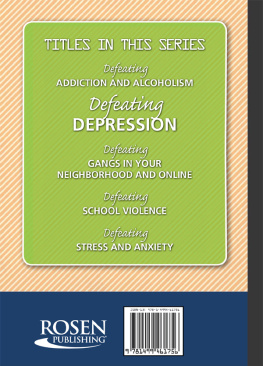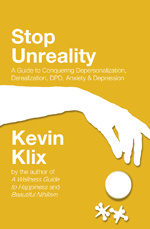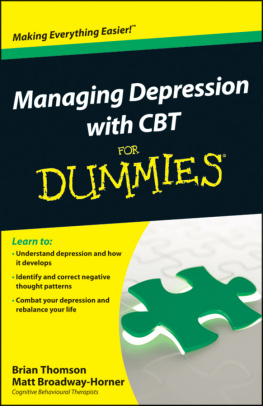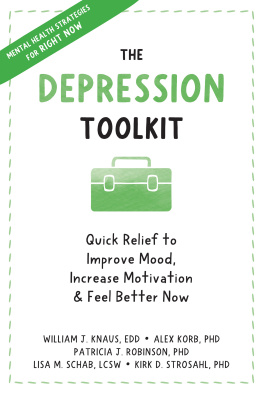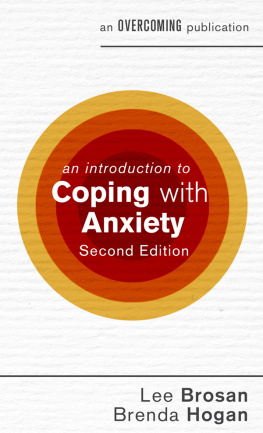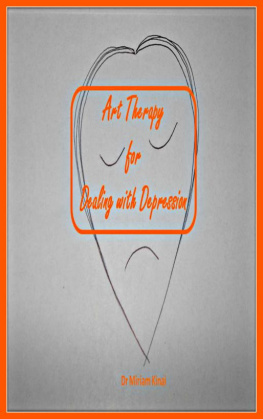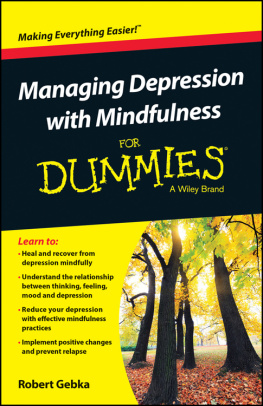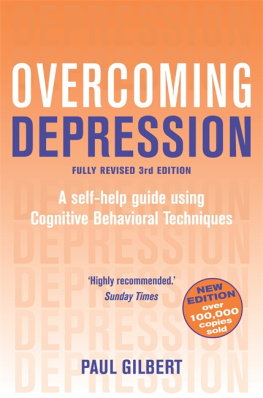An Introduction to Coping with
Depression
2nd Edition
Lee Brosan
and
Brenda Hogan

ROBINSON
First published in Great Britain in 2007 by Constable & Robinson Ltd
This revised and updated edition published in 2018 by Robinson
Copyright Lee Brosan and Brenda Hogan, 2007, 2018
The moral rights of the authors have been asserted.
All rights reserved.
No part of this publication may be reproduced, stored in a retrieval system, or transmitted, in any form, or by any means, without the prior permission in writing of the publisher, nor be otherwise circulated in any form of binding or cover other than that in which it is published and without a similar condition including this condition being imposed on the subsequent purchaser.
A CIP catalogue record for this book
is available from the British Library.
Important note
This book is not intended as a substitute for medical advice or treatment. Any person with a condition requiring medical attention should consult a qualified medical practitioner or suitable therapist.
ISBN: 978-1-47214-022-7
Robinson
An imprint of
Little, Brown Book Group
Carmelite House
50 Victoria Embankment
London EC4Y 0DZ
An Hachette UK Company
www.hachette.co.uk
www.littlebrown.co.uk
Contents
Most of us feel low at certain times in our lives, but find that the feeling improves after a short while. Unfortunately, sometimes these ordinary everyday lows do not lift and depression may start to take over.
This book will help you overcome depression. looks at practical skills you can use to combat the symptoms of depression.
Many people find it most helpful to read and work through the book from start to finish, and to go back and review what theyve read. But you may prefer just to dip into the parts that seem most relevant to you. Its often helpful to write things down, and negative thinking and depression, since those ideas underlie a lot of what we have found to be helpful in overcoming depression.
When youre feeling depressed it can be difficult to believe that it can ever get better. But depression can improve, and you can learn to do something about it. You may not see the results immediately, but if you continue to work at it, then the chances are high that youll start to see changes. There may be times when you feel that things are improving and then they get worse. Dont despair. The course of recovery is never smooth and setbacks are common. Keep going!
This book is designed for you to use on your own. However, if you find that you dont make as much progress as you wish, or if it all feels too much to try on your own, then go to your GP and talk about alternatives. Medication, or help from a qualified therapist, may be helpful for you. It can also be helpful to show the book to a trusted friend or family member who could help you to go through it and who might also find it helpful to better understand what you are going through.
Good luck!
Lee Brosan and Brenda Hogan
Depression is a very painful and sadly very common human experience. It affects about one in five people at some point in their lives. For some people, it might happen only once and pass quite quickly of its own accord. For others, depression may last longer or come back several times and require treatment. Since many people try to hide their depression, you may not have realised how common it is.
Symptoms of depression
Some of the most common symptoms of depression are listed below.
Depressed mood. Feeling low, sad, miserable, hopeless or irritable. Sometimes people feel bleak, numb and empty.
Losing interest and enjoyment in activities you previously enjoyed. Nothing seems fun anymore. Things that used to be enjoyable feel like a chore. Motivation to do almost anything is very low.
Self-criticism and guilt. Feeling that you are bad, useless, inadequate and worthless.
Pessimism. Expecting that things will go badly rather than well. Thoughts such as This wont work out right are common.
Hopelessness. Losing all hope that things can get better and feeling that the future holds nothing but more problems and more depression. Thoughts like Theres no point in trying.
Loss of energy. Feeling tired all the time.
Reduced activity. Sometimes this gets to the point where people do very little, especially when compared to their life before depression.
Withdrawal from social activities. Its common for people to stop returning phone calls and to avoid occasions that involve socialising with other people.
Difficulty concentrating. You may find it harder to read a book or watch a TV programme.
Memory difficulties. Problems with short-term memory are common; for example, forgetting your keys when you go out. There are other memory changes as well: for example, its easier to remember bad things than good things that have happened.
Changes in sleep patterns. You may have a lot of difficulty sleeping or feel as though you could sleep endlessly.
Changes in appetite and weight. Loss of appetite or comfort eating often result in unwelcome changes in weight.
Loss of interest in sex.
Thoughts of death. These range from thoughts that it wouldnt be so bad to be killed accidentally to actively making plans for suicide. If you are having frequent or serious thoughts about suicide then you need to get professional help as soon as possible. If you are already seeing a mental health professional, contact them right away to talk about your thoughts. If not, make an appointment with your GP right away so that you can talk about these thoughts and how you can get help. If you are having very frequent thoughts about suicide and are unable to see your GP straight away, try contacting the Samaritans (see back of book for contact details).
The symptoms of depression can be roughly classified into four main groups:
Mood symptoms, often considered to be the core symptoms of depression.
Physical symptoms, such as changes in sleep patterns, appetite, weight and energy.
Cognitive (thinking) symptoms, including difficulties in concentrating, making decisions or working out problems, as well as memory difficulties. You may also start to think very negatively.
Behavioural symptoms, such as withdrawal from social and other activities you previously enjoyed.
You may have particular beliefs about depression that are not necessarily true and sometimes these beliefs can make depression even worse. Its important to look at these misconceptions and to try to get to a more realistic way of seeing things. We have called these beliefs myths.
Myth no. 1:Nothing bad has happened to me. Theres no reason why I should be depressed. It must be my fault.
Reality: Sometimes its very hard to understand why you have become depressed, and you end up thinking that the depression is in some way your fault. But in almost every case, with some help, you can see what has gone on in a different way in a way that means that you dont have to blame yourself for feeling like that.
Myth no. 2:I dont know why people say this is depression. Ive always felt like this

